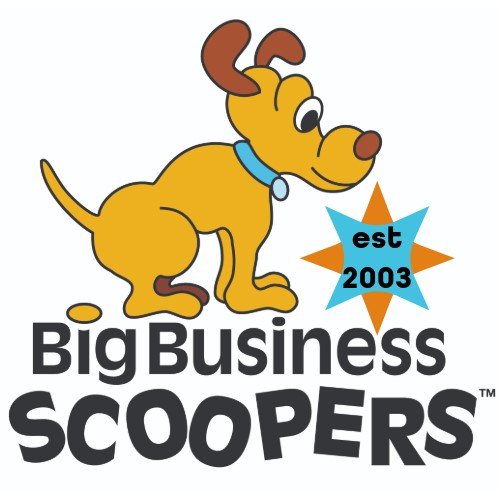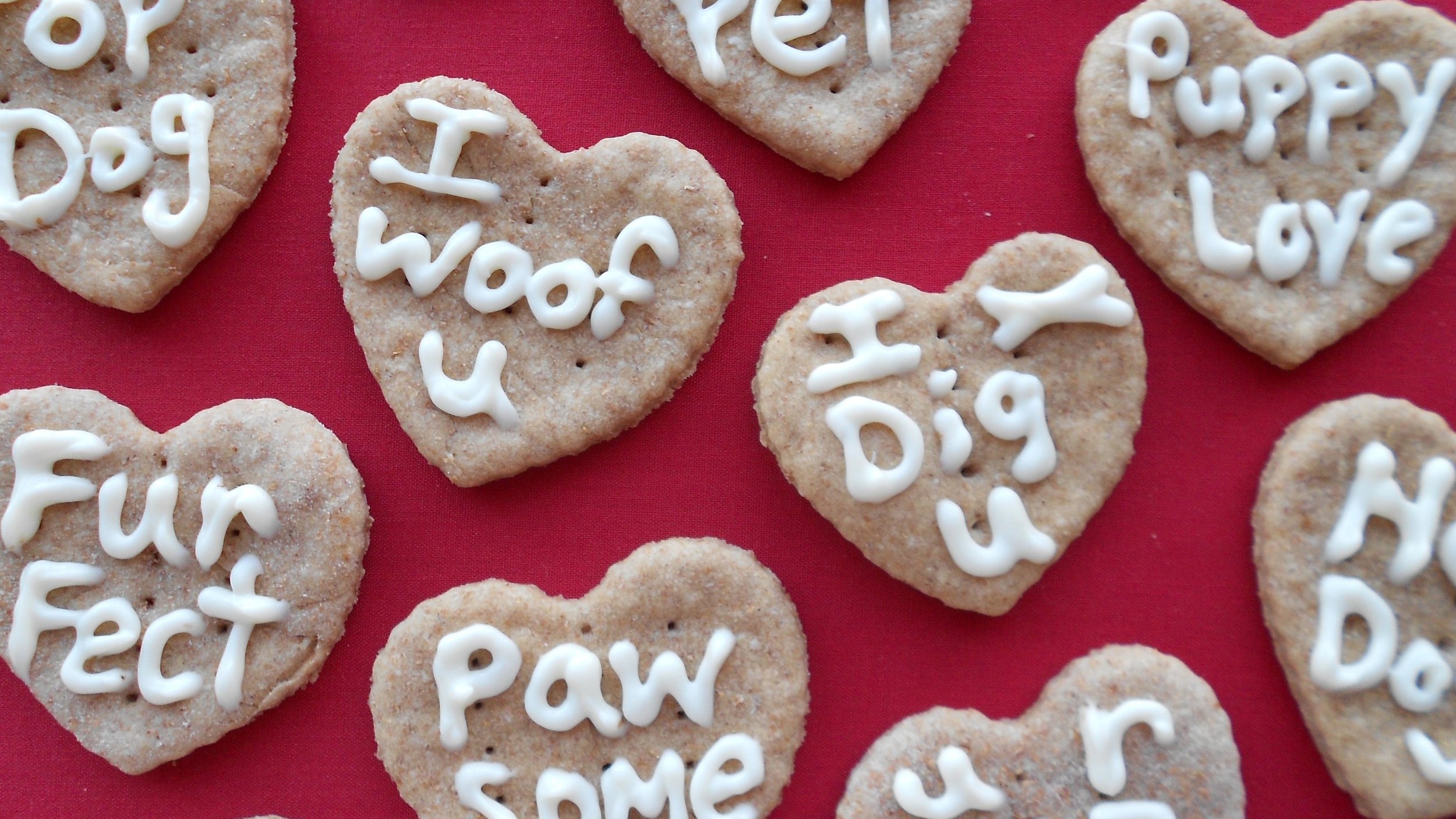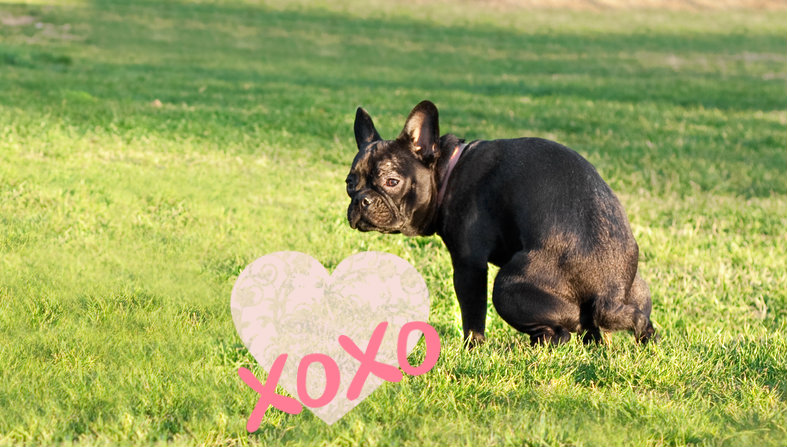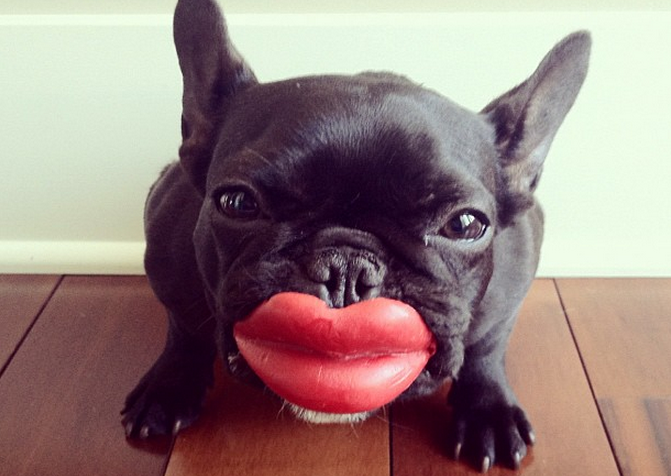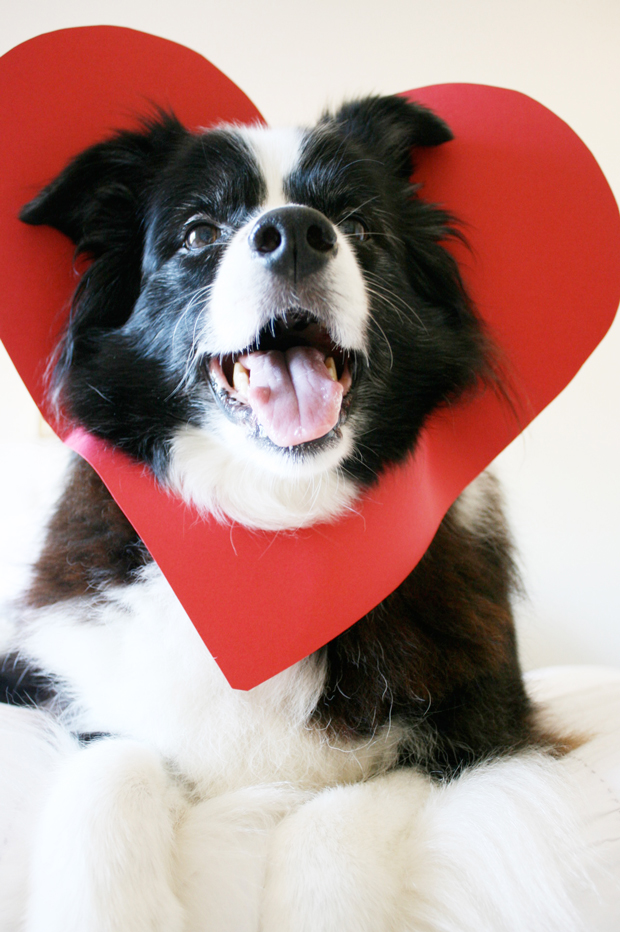Every February, I’m surrounded by messages encouraging me to give a gift of love to that one special somebody in my life. And yes, that’s my dog, Cedar! Of course, there are heart-shaped dog toys and treats I could get for him this year. But I’m wondering: What if I were to sit down and write a love letter to him instead? All I have to do is think about Cedar and I feel calmer, happier, even safer. He is my family, my “forever puppy” and it’s about time I really sat down at this keyboard to put into words the deep love that exists between Cedar (aka Beanie) and I. So, here I go!
Read moreHow to Keep an Old Dog Happy and Healthy
by Nick Burton of Our Best Doggo
Image via Unsplash
Is there anything sweeter than a dog that’s getting gray in the face? Senior dogs make amazing companions, especially for owners who aren’t prepared to keep up with the demands of a high-energy pup. But older dogs come with challenges of their own.
Keeping Up with Vet Care as Your Dog Ages
Regular check-ups are more important than ever when your dog hits the senior years. Wellness visits are a chance for your vet to recommend pet care changes that will preserve your dog’s health and catch diseases before they become prohibitively expensive or impossible to treat.
Wellness visits should be scheduled every six months for senior dogs. Regular dental care also needs to become a part of your dog’s care if it’s not already. Dental problems affect your dog’s ability to eat and can lead to serious infections. Annual cleanings keep your dog’s teeth clean and identify dental problems before they get serious.
Helping Your Older Dog Get Around
Arthritis is common in senior dogs. Like in humans, arthritis affects your dog’s ability to move comfortably. Your dog may walk a little slower, lost interest in jumping onto the couch, or let out a tell-tale groan when settling onto his bed.
Little changes around the house make a big difference in the life of an arthritic dog. Area rugs and stair treads help your dog get a grip on hard flooring, while pet stairs let him climb into the car or onto furniture with ease. When it’s time for bed, an orthopedic dog bed cushions your pet’s aging joints against the hard floor.
It’s extremely important that arthritic dogs exercise. Exercise promotes healthy joints to prevent further degeneration and stops your dog from becoming overweight and adding more strain to his joints. Drs. Foster & Smith offer tips for exercising an arthritic dog.
Fine-Tuning Your Senior Dog’s Diet
Exercise is only one part of keeping your senior dog trim. Portion control is key to preventing weight gain as older dogs start to slow down. If your dog is gaining weight, adjusting his portions is a good place to start. However, you should also rethink what you’re feeding your aging pup.
Senior dogs need food with high-quality animal-based proteins. Senior dogs struggling with their weight also benefit from cutting back on fat. If your dog has trouble chewing kibble because of dental problems, it might be time to switch to soft food.
Thinking about adding supplements to your senior dog’s diet? The omega-3 fatty acids EPA and DHA are especially beneficial for senior dogs’ joints, and glucosamine and chondroitin may help too. Of course, always talk to your vet before giving your dog supplements.
For more information on senior dog nutrition, take a look at Nom Nom Now’s detailed guide.
Dealing with Dementia in Senior Dogs
Sadly, some senior dogs lose cognitive function. Dogs with dementia may show signs of confusion, like getting lost in their backyard or forgetting commands they’ve known for years. They may lose enthusiasm for exercise and play and start having accidents in the house.
Dealing with canine dementia is worrying and frustrating all at once, but there are ways to manage it. On top of talking to your vet about medication (and to rule out other health problems), you can restrict your senior dog to areas of the home that are easy to clean and increase the frequency of trips outside to reduce accidents. Keeping a predictable daily routine also helps. Be sure to include exercise in that routine! Exercise minimizes sleep disruptions in dogs with dementia and provides essential mental stimulation.
Living with a senior dog can be tough, especially if your schedule doesn’t grant you a lot of time to keep up with your dog’s increased needs. But that doesn’t mean you can’t be a great owner to your aging pup — you just need a little extra help! From dog walkers to poop scoopers, there’s no shortage of dog-loving professionals who can help your senior dog age with grace
7 Ways to Show Love to Your Dog This Valentine's Day
It’s Valentine’s Day again and love is in the air. All this talk of roses, candy and Hallmark love is enough to make a lot of people feel downright sick. That is, of course, unless you have a dog. Because everyone knows that a dog is the very best date to have on February 14th. So how can you show them just how much they are loved?
1. Give Them a Special Treat
What says “I love you” more clearly and emphatically than food, especially for a dog? Treat your pup to a new treat or make some yourself!
2. Go on a New Adventure
Whether it be going on a serious hike, letting them get messy or just driving one town over for a walk, new places are stimulating and exciting for your dog. So strap them in, get going and show them you love when they have a good time!
3. Have a Play Date
Is there anything cuter than dogs being playful with each other? Consider inviting your dog’s best friend over for a whole morning or afternoon of playtime.
4. Learn a New Trick
Training doesn’t have to be all about teaching your dog commands that you need for them to learn (sit, stay, heel, etc.) . It can be so much fun for both of you to embark on training a fun new trick like roll over, play dead or spin. And training is an incredible bonding experience - perfect for the day of love.
5. Get Pampered
Did somebody say spa day? Make no mistake, many dogs enjoy being pampered just as much as we humans do so why not treat your doggo to a luxurious grooming session?
6. Find a New Toy
We all know that nothing will replace your dog’s favorite, special toy. But something new is always fun! Why not stop by your local pet store and let your fur baby pick out their own new toy?
7. Hire a Pooper Scooper Service
Last but not least, do you even love your dog at all if you haven’t hired a pooper scooper service for them?? But for real, a consistently clean yard is a great way to show your dog that you value their health and happiness. So contact us today.
PHOTO CONTEST: Share the Love with Valentine's Dog Pics!
Bouquets of roses, boxes of chocolates, overpriced Hallmark cards, professions of undying love and ... ridiculous and cute photos of your dog?
ONE winner will receive one FREE service taken off their next invoice, if an existing customer. OR one FREE initial cleanup (a value of up to $80) when signing on for one month of poop scooping service as a new customer.
Enter the Valentine's Dog Contest before 11:59 PM on Wednesday, February 13:
Reply to this email with a photo of your dog and any Valentine's theme you like. Whatever strikes your fancy and relates to love kitsch!
Include the names of all dogs included in the photo.
This will be Big Business'sVERY FIRST MERIT-BASED photo contest. We will judge your photo by its creativity and quality. The winner will be announced on Valentine's Day via our Facebook page! All entered pup pics are subject to inclusion on our website's Pet Gallery and social media pages.
Have fun sharing the doggie love!
Dog Digging Habits: Causes and Preventative Measures (Hiring a Pooper Scooper Can Help!)
As dog parents, we all know that there are few nightmares worse than having your beloved dog get loose or run away. Having a securely fenced-in back yard can certainly be a strong step in the right direction toward preventing such a catastrophe. But remember that you also need to keep your dog from digging under that fence! This is a common problem that we see frequently when visiting customers’ yards for their regular poop scooping. We always snap a picture and alert the household immediately if some rascal is digging away in the yard. And we always wish we could do more to help like, say, write a blog on the subject!
How can you know if your dog is ever going to be prone to digging? Many breeds are automatically predisposed to this behavior because the evolution of their breed probably called for digging as part of their job. They are born to dig! Such “hard core” digger breeds include dogs in the Terrier Group ( Bedlington Terrier, Cairn Terrier, Miniature Schnauzer), the Hound Group (Beagle, Dachshund) and Sporting Group (Wirehaired Pointing Griffon). Other dogs are more “fair weather fans” of digging and are a little less aggressive with their escape attempts! These dogs include those in the Working Group (Siberian Husky, Alaskan Malamute) and Herding Group (Australian Shepherd, Border Collies.) . While this is not an exhaustive list, it’s certainly a start to understanding your digging dog and which breeds will be more likely to dig. Learn more at Petcha!
So you already know there’s a problem and now you need a solution. If you have the time, patience, yard space and wherewithal (if you plan on hiring a professional to assist) to train your dog to curb his digging habit, rest assured that it IS possible. Wag! says that “even the most determined digger will respond given time and patience.” The trick is to remove the stimuli that is driving him or her to dig (boredom, lack of mental stimulation, heat) and encourage digging in a specified “dig zone.” This dig zone can be filled with sand, dirt or whatever your dog likes to get into and it can be fenced off if you prefer. Teach your dog, with treats, toys and puzzle feeders, that this location is where they should go to do their digging! Be sure to give them plenty of encouragement and rewards. It will make your dog happier and safer while giving you peace of mind that he or she will not be digging around the fence that could lead to him getting lost!
Of course, this type of training may not be for every human or for every dog. You may not have the time to train or your yard might not be large enough to contain a dedicated “dig zone.” Or your dog might be particularly stubborn in this habit. What’s the answer then? Reenforce the fence! If your dog is going to keep digging there, so be it, but at least you can prevent them from popping out on the other side. Buried fencing materials for dig defense are available at most major home improvement retailers. Chicken wire is also an excellent option for shoring up your fence.
Whatever you choose to do, consider Big Business Scoopers or your local dog poop pick up and removal company, as another line of defense in your quest to keep your dog safe and contained despite all the digging. If we see any holes getting out of hand, we contact you immediately, with a picture, so that you can be sure to block continued and further attempts in that area. Together, we can keep your digging dog safe from harm!
Snow Policy Explanation ... Let It Snow!
Happy 2019 to you all! Here's to another year of poop-free yards! We'd like to kick off the new year by reviewing our snow policy.
If there has been only a very light dusting of snow, we and our team of Scoopers can find what we are looking for and go about business as usual. But even when the grass is still visible in heavier dustings it becomes difficult to find deposits since they are lower than grass height. So if it snows much more than a very light dusting, we may need to skip that week's scheduled scooping as we cannot, alas, pick up what we cannot see.
When snow is already on the ground, though, we absolutely forge ahead as usual to get your yard all cleaned up. The only exception to this is when freezing rain has created slick and dangerous conditions. But most often, the issue usually ends up being the timing of the snowfall and how close it happens before your scheduled service.
If you decide to clean up during a week that is missed due to snow, please let us know and we will credit your account for that week. Otherwise, we do charge your usual amount as there is a double job to do when your Scooper returns and it's usually under "frightful" conditions.
We hope this helps clear things up before the dead of winter hits!
Cheers,
Tina LaBeaume
POOlution: The Environmental Problem of Dog Waste
A single dog poop can contain millions of germs, parasites and bacteria that are harmful to human and dog health alike. The Environmental Protection Agency places dog waste in the same category as herbicides, insecticides, oil, grease and other toxic chemicals. And with the number of dogs living in America on the rise, with 89.7 million recorded in 2017, the amount of this toxic waste in our environment is also on the rise. Dog poop that is left on the ground can be carried up in stormwater and make its way into our untreated waterways. This poses a great risk to organisms that depend on those ecosystems as well as people who use them for recreational purposes. In order to protect New Jersey's five water regions and has twenty watershed management areas (WMAs), and our environment as a whole, we must be more conscious about how we handle and dispose of our dogs' waste.
The first thing you can do to help minimize the negative impacts of dog waste on our environment is simply to make sure that it is picked up on a regular basis. Ideally, dog waste should be picked up as soon as it hits the ground and this is especially true when you are walking your dog in your community. But every practical dog owner knows that this just isn't feasible when it comes to dogs using a private outdoor space like a yard or dog run on a regular basis. In this situation the best frequency of pickup really depends on the size of the space, number of dogs and humans using it and its proximity to waterways. But the safest bet, as a general rule, is to pick up collected dog waste once every week. This is what we recommend for most of our clients.
When we go to a yard for a cleaning we use 13 gallon trash bags to line a bin into which we deposit each pile of poop that we find using a hoe-like periscopic tool. At an average stop we collect one bag and then place that bag into a second bag before placing it into the trash or hauling it away (either way, its destination is the landfill.) During first time cleanups, like the one pictured below, and at yards that are used by three or more dogs it is more common to use 2 or more bags. With an average of 25-30 stops per route, collecting at least 2 bags per stop, Big Business Scoopers alone uses 50-60 plastic trash bags per route. Our Scoopers manage 17 routes per week over several New Jersey counties, bringing this total to at least 850 plastic bags used per week. Of course, plastic is currently the optimal way to contain this toxic waste quickly and effectively, in order to prevent the spread of illness, but we do understand the implications of our business using so much of it. Sometimes, it feels like we are canceling out the good we do of removing dog waste by also depositing so much plastic into our environment. Talk about a conundrum!
We pride ourselves on helping create a world in which dogs (and their humans) can live together even more harmoniously by enjoying safer and healthier outdoor spaces. Thinking responsibly about how we are impacting our communities and environments by how we handle dog poop pick up and removal is an integral part of constantly striving toward that goal. And to that end, we are, in this 15th year of business, beginning to look into options for disposing of dog waste in a more sustainable and eco-friendly way. It will likely be a many years journey of discovery along which we are sure to make mistakes and learn some stinky lessons. But we feel that it is imperative that we always attempt to do our small part.
The options are many and varied for offering our customers greener options. We can swap 13 gallon plastic bags for ASTM 6400 certified large compostable bags like those offered by EcoSafe or BioBag, which will break down after reaching the landfill thus reducing plastics waste. There is a product called Doggie Drain that seamlessly hooks up to a building's outdoor sewer line, allowing our Scoopers to flush (with a hose) dog waste directly into the sewer system. Some trail blazers in the pet waste removal industry, like Green Scoop in Ohio, are partnering with local water treatment plants or companies that have the capability to convert dog poop into natural gas and electricity. Then there are DIY dog poop composter products like the Doggie Doolie which could be good options for dog owners with a lot of property and an open mind about composting right at home! And there are certainly others that we have not yet come across. We hope to share what we learn here on the blog as well as on social media so please feel free to follow along on this journey and share your thoughts and comments.
Here's to greener dog poop!
Best Tips for Keeping Fido Fit and Happy
Are the neighbors complaining because Fido barks all day while you’re at work? Does he seem a little too busy when you’re home, delving into forbidden treasures and activities? Is your pooch getting a little paunchy? All these issues suggest your dog may need more exercise. Here is how to provide him with the activity and stimulation he needs.
Know your dog’s needs
All dogs need some level of exercise, but physical activity requirements vary based on breed, age and other sorts of characteristics. Since every breed is different, you should become familiar with your dog’s exercise requirements. For instance, small, sedentary breeds may be perfectly content lounging most of the day with a quiet stroll around the block or a game of indoor fetch stimulating enough to be fit and content. However, working breeds often require substantial activity with some studies showing very energetic dog breeds thriving with over a 90 minutes of exercise every day. Do you have a mutt? This can make things more complicated, but listen to what your dog is telling you to know if he’s getting enough time romping. If he’s acting up or getting pudgy, you should step things up a notch.
It’s more than fitness
Without enough exercise, your dog can experience other issues. According to some experts, without sufficient activity your dog can have increased anxiety, won’t age as well, can become apathetic, and may develop behavioral problems. Exercise offers an opportunity to bond with your pet, play and work on any training issues as well. If you struggle with providing a hardy workout, your dog may benefit from a backyard dog run. If you have enough room for one, some experts point out an outdoor dog run is a terrific option. It’s less expensive than fencing your entire yard, it’s normally secure so your dog can’t escape. Alternatively, there’s always the neighborhood dog park. A dog park is a great way for your pet to run around and socialize with other canines. A lot of cities even offer enclosed dog parks, which also helps with containment if your dog is a runner. Remember, if you do opt to visit a dog park, follow general safety rules and keep an eye out for aggressiveness in your dog or others dogs, and try to keep your pet away from an animal that appears sick.
Ease into it
Before you jump into a canine fitness regimen, Women’s Health suggests talking with your dog’s veterinarian. Your pet’s doctor can warn you about any concerns regarding your individual dog’s health. And remember, just like with people, dogs can get tired or sore from going at a new workout routine too hard. Ease into your new workout program and watch your dog for signs he’s overdoing it, like stopping more frequently, an unhappy demeanor, or acting more sluggish. When preparing for your outdoor exercises, also be sure you have the right equipment. For instance a well-chosen dog leash is comfortable for your pooch and easy for you to use.
Break up the routine
There are lots of things you can do with your dog that provide great exercise. If you’re looking to spice things up, K9 Magazine recommends a game of tug-o-war with an old T-shirt, playing Frisbee, or doing some “doga” (dog yoga) with your pooch. As The Bark explains, doga provides the added benefit of giving your furry family member a good onceover on a regular basis, so you’ll notice any new lumps, bumps or other issues.
Lazy pups
Sometimes, there are other ways you can address your dog’s fitness. If your dog’s breed athleticism requirement is normally couch potato level, you may need to simply cut some calories. This can mean a lighter food, less snacks, or a reduced quantity of the same food. You can also do simple activities such as hide your dog’s toys in various places around the house. Just needing to look for favorites in new places is enough to keep a lazy breed busy and burning a few additional calories.
Healthy and happy
Keeping your dog fit is more than a physical concern. Providing enough exercise and stimulation also keeps your pooch from becoming stressed and developing behavioral problems. Get to know your dog’s requirements and then take steps to get Fido fit!
This guest post was written by Jessica Brody of OurBestFriends.Pet. Top image via Pixabay.
First-Time Pet Owners: What’s Right for You?
Some of your first memories might be of your family’s golden retriever, who let you saddle and ride her on piggyback through the backyard when you were little. Or, maybe they’re of the tabby you used to find snuggled in the crook of your legs when you woke up. You grew up with these animals, and now that you’ve moved into your first apartment or put a down-payment on your first house, you want your own pets. The tips below will help you decide which one is right for you, and how to set up your home so that they’ll flourish there.
What’s Right for You?
First, figure out what kind of pet you want. Let’s say it’s a dog. Keep in mind that dogs vary wildly in size, so take that into account when considering the space you can offer them. Some websites will even quiz you about your life to determine which breed will thrive in your living arrangement. If the dog you get is going to be alone in an apartment with no yard for more than 40 hours a week, you might choose a small breed like a Boston terrier. On the other hand, if you live in a house in the suburbs with a huge yard and young children, you might go with an English setter instead.
What’s Right for the Pet?
As you’re thinking about which pet is right for your home, also look at the situation from their viewpoint: What’s best for them? Some pets require minimal accommodations. Fish, for instance, necessitate aquarium maintenance, fish food, and little else. For turtles, iguanas, and other reptiles, you need to regulate their temperature and provide them with enough light, but they’ll thrive in an aquarium, too. With dogs and cats, extending their living space into a backyard often comes as a boon. The optimal size of your yard depends on your pet. A mastiff needs a pasture-like spread to bound around in, while a manx will mostly laze on the table on sunny afternoons. Whichever pet you get, consider building a fence around your yard for its safety. Fences protect your pet from thieves and bigger animals and prevent it from running away.
And for dog-owners who don’t have a yard, fear not: Going on a jaunt with your dog provides it with much of the exercise it would’ve gotten digging up your tulip beds. Plus, it offers other benefits – structuring the dog’s day, teaching it to socialize with other dogs, calming any boredom it pent up indoors, and more. Your part in this deal is to keep it skipping along for 30 minutes and to have a doggy-bag handy at all times. Proper pet waste cleanup practices are worth a mention, not just out of etiquette, but because dog feces can contain salmonella, hookworms, roundworms, and other viruses that none of your neighbors want transmitted to their own pets.
One of the last (but most vital) considerations to weigh when you get a dog is its age and background. Older pets will need a few modifications to keep them comfortable, and even the kindest rescue dog will be wary of you at first, especially if it suffered abuse in a previous home. To earn its trust, don’t force your own kindness on it. Feed it at the same time every day, but also give it space to eat, so that after it feels nourished, it’ll come to you on its own. Preparing your home for an older dog calls for many of the same acclimating strategies: Make sure your house is quiet and warm to impart in it a sense of safety. Once it seems settled, take it to the vet for a checkup, and ask if you should mix any arthritis or dry skin supplements into its food.
And after all that, walk it on quiet mornings, and let it roam through your (fenced-in) backyard, and unfold a rug in front of the fireplace so that it can stretch out before the blaze on cold nights, because an elderly dog can instill in you the same sense of peace that it needs, too.
This guest post was written by Jessica Brody of OurBestFriends.Pet. Image via Pexels
Interview: Debbie Huff of PooPrints
Do you ever wish it were possible to catch and penalize people who don't pick up their dog's poop? Well, in thousands of managed communities across the nation, not only is it possible but it's a reality. PooPrints is an effective pet waste management program, matching unscooped waste to the canine offender through DNA. How does it work? It's astonishingly simple. Every dog owner on a participating property is required to register their dog on PooPrints' DNA World Pet Registry with a cheek swab. Then, when unscooped waste is found, a small sample is collected and sent to the lab to identify the source. Residents are fined for every offense and PooPrints reports that properties see up to a staggering 95% reduction in waste!
Needless to say, we had to find out more. So we linked up with Debbie Huff of PooPrints of Philadelphia LLC which serves Pennsylvania, New Jersey and Delaware. Here is what we learned:
BBS: Who founded PooPrints and what is the story behind their idea?
DH: PooPrints was founded by BioPet’s Science team in 2008. BioPet was functioning as an outsourced Veterinary/Pathology Lab. We had a scientist that had recently moved to town living in an apartment community who saw the excess waste problem on the property. Then one morning the scientist herself accidentally stepped in a mess. She came into the office and said that there had to be a way to determine who left the waste. At that time the team started to do some research on extracting DNA from fecal matter and PooPrints was born. From there Tom Boyd, CEO of BioPet, and team discovered the need in the multi-family community and set out to develop a network of distributors.
BBS: What is the #1 concern that you hear from interested property managers? How do you best address it?
DH: Other than cost…the most common question is, “How much time is involved in getting the program started at a location.” There is a little extra time involved in starting the program because a DNA sample needs to be taken from each dog on the property. Once management is trained on how to take a DNA sample they find out it only takes around 7-8 minutes to complete. Not much time at all and it only has to be done once. And when the benefits of PooPrints is explained to the resident during the DNA testing process, most locations find that their pet waste problems decrease by 75% because the program works great as a deterrent. This frees up management time because they find they have a significant reduction in time they have to spend in handling pet waste issues and questions.
There is a onetime charge for a DNA test for each dog that lives on the property. This cost can be less than the price of a large bag of dog food. The DNA testing cost can become a part of the pet fee a location may charge.
BBS: Do resident pet owners at participating properties ever balk at the idea of registering their dog for this purpose? How do you handle this issue (if it is one)?
DH: As a whole, most residents are thrilled to see PooPrints come to a property. Once the program is explained to residents, pet owners and non-pet owners see that it will hold dog owners accountable for doing the right thing in regards to picking up pet waste. Normally the pet owners that may balk at the program are the owners not currently picking up the poo and they know they are finally going to be held accountable. Dog Poo on a property doesn’t only cause “curb appeal” issues, it can also cause disease and parasite problems for other pets and children on the property. By explaining these concerns, management can usually overcome issues.
BBS: When unscooped dog waste is found who is usually the one to collect and submit it to your lab for analysis? Residents, maintenance crew?
DH: If a property has a maintenance staff, they are usually trained to collect the poo and how to submit the sample to our lab. In locations where there is not a maintenance staff the management may collect the sample. At condos, I often find that a “dog committee” is usually formed and someone on that committee may collect the sample. There are many ways to implement the program; implementation can be customized for the size and type of the managed community using PooPrints DNA pet waste management.
BBS: About how many accounts do you have open in New Jersey? As the most densely populated state I’m sure it has a particular need for this service, am I correct?
DH: PooPrints has over 3,000 managed communities using our program in the USA. We can also be found in Canada and Europe. There is a growing concern about pet waste runoff into our waterways. With the dense population of NJ and the many waterways, NJ has a real need to control pet waste and safeguard our environment.
BBS: We all know that the best thing about a dog business are the dogs. While you may not deal with dogs directly on a daily basis, you surely have a cute/funny/unusual story to share...
DH: One of my favorite stories came from a property manager at an apartment that had a pet waste issue for years. She found out about PooPrints off the internet and called me about starting on the program. The announcement to start the program was sent out to residents on a Friday and she told me over the weekend residents were outside with buckets picking up their dogs waste. The following spring, the PM told me it was the first time in over a decade that when the snow melted, their lawn was not covered in pet waste! What a success story!
One of the hidden benefits of PooPrints is our free lost and found service. Our lab has stated they get a call a week to help get a lost pet back to its owner!
BBS: What is the ultimate, pie in the sky goal that PooPrints is trying to achieve and what active steps are they taking toward that end?
DH: PooPrints functions on three pillars. Promoting responsible pet ownership, protecting and expanding Pet Access, and safeguarding the environment. Our program focuses on accountability, but also allows for more dogs to live more places. Our vision for PooPrints is that it becomes a pet amenity, industry standard in the multi-family community. The program will allow for breed, size, and pet restrictions to be lifted. We see PooPrints paving the way to educate the masses on the additional benefits of DNA Registration, ultimately becoming a solution for municipalities. We take our science seriously and we are always evaluating our service and program to ensure that we are meeting the quality standards and ease of implementation that our clients demand. To assist in helping achieve these goals we are working to add value and resources within our technology that allow our communities and resident to understand the health and wellness of their pet. This gives our customers the added benefit of living in the digital age with their canine, and positions PooPrints to be the trusted resource in Waste management and pet health.
For more information about PooPrints please visit their website:
